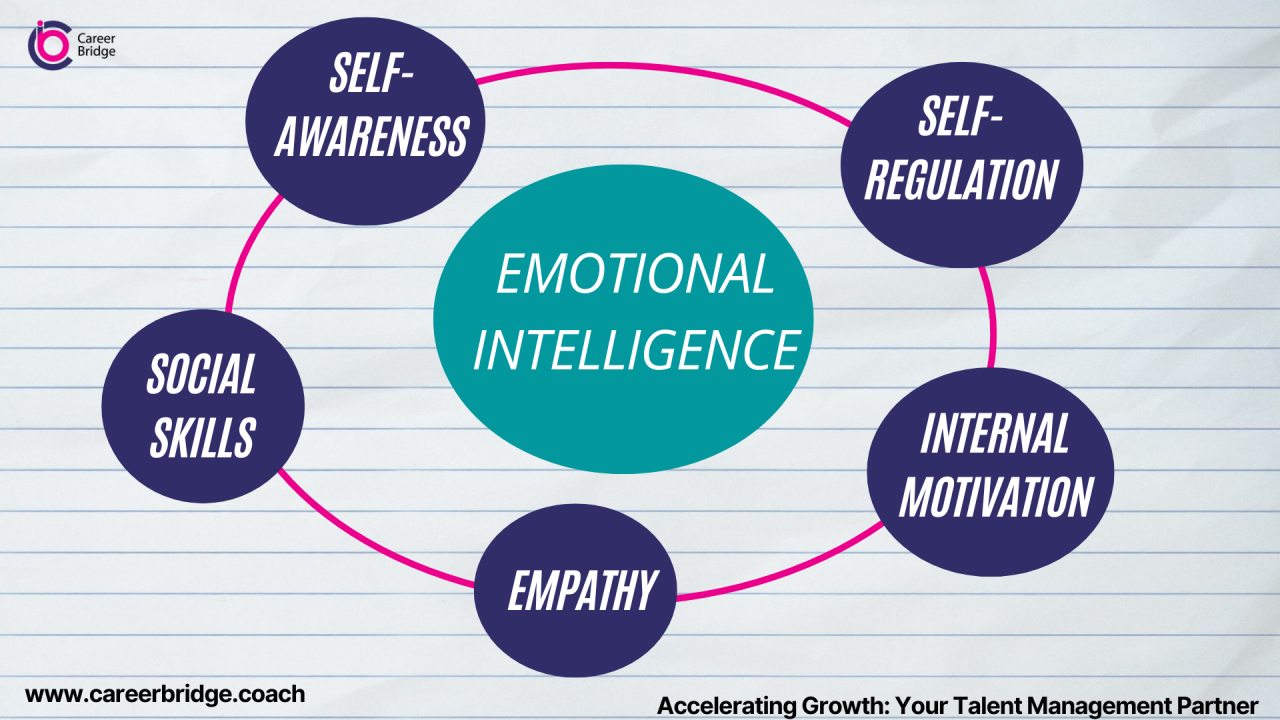
"Leadership is about empathy. It is about being able to relate to and connect with people to inspire and empower their lives."
These words by Oprah Winfrey encapsulate the essence of emotional intelligence in the workplace. In an era where technical skills and cognitive intelligence alone are no longer sufficient, emotional intelligence has emerged as a critical determinant of success in professional settings.
This article explores the vital role of emotional intelligence in the workplace and how it enhances job performance by improving decision-making, communication, and adaptability.
Emotional intelligence, the ability to recognize, understand, manage, and utilize one's own emotions as well as the emotions of others. It encompasses skills such as self-awareness, self-regulation, motivation, empathy, and social skills, all essential for navigating modern work environments' complexities.
Signs of emotional intelligence include:
Emotional intelligence encompasses several key components:
These components work together to help individuals navigate social complexities, lead and motivate others, and manage stress and conflict effectively.
Improved Decision Making
Emotionally intelligent individuals excel at recognizing their emotional responses and those of others, which enables them to make more informed and balanced decisions. This heightened awareness helps them evaluate situations objectively without being clouded by unchecked emotions.
By remaining calm and collected, they can weigh the pros and cons of each option more effectively and choose the most rational and practical solutions. This approach leads to better problem-solving and enhances overall organizational decision-making processes.
Effective Communication
Highly emotionally intelligent individuals excel in communication. They actively listen, express their ideas clearly, and understand non-verbal cues such as body language and facial expressions. This ability to read and interpret non-verbal signals leads to fewer misunderstandings and more productive interactions. Effective communication fosters a collaborative environment where ideas are exchanged freely, and team members feel heard and valued. This, in turn, enhances teamwork and drives the organization's collective success.
Adaptability
Rapid changes and constant evolution characterize the modern workplace. Emotionally intelligent employees are more adaptable because they can manage their stress, stay positive, and inspire their colleagues during transitions. Their ability to remain flexible and open-minded allows them to positively embrace new challenges and changes. This adaptability helps them thrive in dynamic environments and sets a positive example for their peers, encouraging a culture of resilience and continuous improvement.
Conflict Resolution
Emotional intelligence equips individuals with the skills to handle conflicts constructively. They can navigate disputes by understanding different perspectives, remaining calm, and finding mutually beneficial solutions. Their ability to empathize with others and control their emotions helps de-escalate tensions and fosters a collaborative approach to conflict resolution. This leads to a more harmonious work environment, where conflicts are seen as opportunities for growth and improvement rather than sources of division and stress.
Fostering Team Cohesion
Building Trust
Teams with high emotional intelligence are characterized by trust and openness. Members feel safe expressing their thoughts and emotions, creating a more inclusive and supportive atmosphere. This trust is the foundation of effective teamwork, encouraging open communication and mutual respect. When team members trust each other, they are more likely to collaborate effectively and work towards common goals, enhancing overall team performance.
Enhanced Collaboration
Emotionally intelligent team members collaborate better because they can empathize with others, respect diverse viewpoints, and work towards common goals with minimal friction. Their ability to understand and appreciate different perspectives fosters a culture of inclusion and cooperation. This enhanced collaboration leads to more innovative solutions and higher productivity as team members leverage each other's strengths and work synergistically to achieve their objectives.
Encouraging Positive Work Culture
Leaders with high emotional intelligence can inspire and motivate their teams, creating a positive work culture that values respect, support, and appreciation. This culture encourages employees to perform at their best and feel more connected. When employees feel valued and supported, they are more engaged and committed to their roles, which boosts overall morale and productivity. A positive work culture also attracts and retains top talent, contributing to the organization's long-term success.
Facilitating Team Development
Emotional intelligence helps recognize and nurture the strengths and potential of team members. Emotionally intelligent leaders can provide constructive feedback and support professional growth, which benefits the team. By identifying individual strengths and areas for development, they can tailor their approach to meet the unique needs of each team member. This personalized support fosters a culture of continuous learning and development, empowering employees to reach their full potential and drive the team's collective success.